
Understanding Hard Water: Impacts on Household Appliances
Published by Michael Doyle - Buyers Guides
See More Related Articles ›
Water plays a crucial role in the day-to-day functioning of any household. For many households, water characteristics depend greatly on geographical locations. One of these characteristics is hardness, caused by high mineral composition. In this context, hard water refers to water naturally high in mineral content, specifically calcium and magnesium.
Geographically, hard water is prevalent across various continents, including many regions in Australia, Europe, and North America. Increasingly, it is recognised as an issue due to its potential negative impact on household appliances. Consequently, understanding the effects of hard water on appliances and how to manage these effects has become vital for homeowners.
This comprehensive guide is designed to assist you in understanding what hard water is, the problems it may cause for household appliances, and practical solutions to mitigate these issues. Furthermore, the article delves deeper into the specific effects of hard water on washing machines, and ways to prolong appliance longevity in hard water areas. It also explores the broader environmental and economic implications of hard water, highlighting the importance of proactive prevention.
Water’s hardness or softness is determined by its composition of dissolved minerals. Hard water is rich in minerals such as calcium and magnesium, picked up from the earth and rock as water passes through, largely defining its ‘hardness’.
Soft water, conversely, has a lower concentration of these minerals, making it less problematic for various uses, including operating household appliances, washing, and cleaning. The interaction of these minerals with detergents and soaps cause them to work less efficiently, thereby resulting in incomplete rinsing, residue, and increased soap usage.
Simple home kits are available to test if your water is hard or soft. By identifying the type of water running through your home’s taps and appliances, one can address potential issues effectively. Hard water is problematic due to its potential to cause mineral buildup in pipelines and appliances, which, over time, can reduce appliance efficiency significantly or cause mechanical failure.
Appliances such as washing machines, dishwashers, coffee makers, and water heaters bear the brunt of the hard water impact. As hard water flows through these devices, minerals like calcium and magnesium adhere to surfaces, forming scale deposits. These deposits compromise the efficiency of the appliances, causing them to use more energy and potentially break down sooner than expected.
The accumulation of scale can reduce the functional efficiency of these appliances, resulting in subpar performance, increased energy usage, and potential mechanical damage. If you notice cloudy glassware from the dishwasher, reduced water stream from coffee makers, or white deposits on faucets and fixtures, these could be indicators of hard water affecting your household appliances.
Appliance experts and plumbers have frequently noted that untreated hard water can lead to significant deterioration in the service life of these appliances. The scale deposits can necessitate earlier replacement of appliances, leading to increased costs for homeowners in the long run.
Among all home appliances, washing machines seem to be the most adversely affected by hard water as they are frequently in direct contact with water. The buildup of scale in washing machines can impact various functionalities, particularly heating and washing efficiency. The mineral deposits collect on heating elements, interrupting its functioning, making it harder for the machine to heat water and affecting cleaning efficiency.
Over time, the more complex the machine must work to maintain its cleaning efficiency, the more electricity it consumes. This increase in energy usage can lead to growing electricity bills, making hard water an expensive concern.
Managing the potential adverse effects of hard water necessitates some planned action on a homeowner’s part. One practical solution is introducing a water softening system to your home. Water softeners work by replacing hardness ions (like calcium and magnesium) with sodium ions, which soften the water before it enters various appliances.
Regular appliance maintenance and descaling procedures are critical to ensuring your appliances are kept at their optimal performance level. Additionally, using detergents and cleaning agents specifically designed for hard water can limit mineral buildup within these appliances, prolonging their lifespan.
Beyond being a household concern, hard water also contributes to broader issues. Appliances operating under the strain of hard water often require significantly more energy to function, leading to higher electricity bills for consumers. Furthermore, this increased energy consumption contributes substantially to one's carbon footprint, thereby accentuating the environmental impact of high energy usage.
The downstream costs associated with repairing or replacing hard water-damaged appliances can also be considerable. The use of preventative measures, such as water softeners or routine maintenance, can significantly reduce these potential costs, making it an economically wise decision in the long run.
Hard water poses a significant and costly challenge for household appliances. Understanding the problems associated with hard water and how to manage them effectively can keep appliances running efficiently and save homeowners from unnecessary expenses in the long term. A combination of water softeners, specially formulated detergents, and regular appliance maintenance can offset the impacts of hard water.
Making an effort to ensure your home is equipped to deal with hard water can elevate your overall quality of life while doing your part for the environment. If you live in an area prone to hard water, understanding and responding to the effects your water can have on your household appliances is a worthwhile endeavour.

































